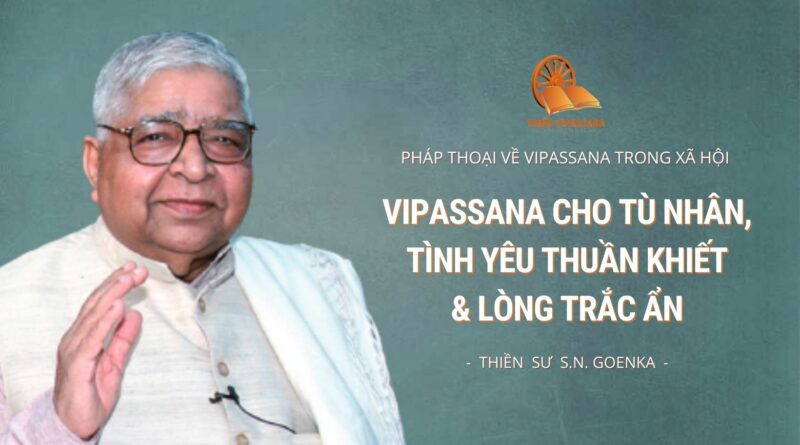Vipassana for Prisoners – Vipassana cho tù nhân
Experiencing the reality within has helped many thousands suffering within prisons. Now, many prisons in India are organizing Vipassana courses for their inmates, as a reform measure. Prisons in other countries like the USA and the UK too have started introducing Vipassana. Many prison officials across the country now realize that Vipassana spreading in society will help prevent crime. Prevention is no doubt better than cure.
Trải nghiệm thực tế bên trong đã giúp hàng ngàn tù nhân đau khổ. Bây giờ, nhiều nhà tù ở Ấn Độ đang tổ chức các khóa thiền Vipassana cho các tù nhân, như một biện pháp cải cách. Các nhà tù ở các quốc gia khác nhau như Hoa Kỳ và Vương quốc Anh cũng đã bắt đầu đưa Vipassana vào. Nhiều quan chức nhà tù trên khắp đất nước nhận ra rằng việc phổ biến Vipassana trong xã hội sẽ giúp ngăn ngừa tội phạm. Phòng ngừa chắc chắn là một biện pháp tốt hơn sửa đổi.
Actually, not only the inmates of prisons, but everyone outside the four walls of a prison are also prisoners – prisoners of the unwholesome habit pattern of their own mind. This prison of defilement causes more misery than the prison of walls and guards. Vipassana enables everyone to be free from this prison of the impure mind, and be free from misery, to experience real happiness, real freedom, and real liberation.
Trên thực tế, không chỉ các tù nhân, mà tất cả mọi người bên ngoài bốn bức tường của nhà tù cũng là tù nhân – họ là tù nhân của mô thức thói quen bất thiện trong tâm trí của chính họ. Nhà tù tâm trí ô uế này gây ra nhiều đau khổ hơn nhà tù của bốn bức tường và lính canh. Vipassana giúp chúng ta thoát khỏi nhà tù của tâm trí bất tịnh này, và thoát khỏi đau khổ, để có được hạnh phúc thực sự, tự do thực sự và giải thoát thực sự.
Pure Love and Compassion – Tình yêu thuần khiết và lòng trắc ẩn
A highly pure mind naturally generates ‘maitri’ and ‘karuna’, love and compassion for others. ‘Maitri’ and ‘karuna’ must be generated from the deeper level of a pure mind. Otherwise it will only be superficial and not effective.
Một tâm trí rất thuần khiết tạo ra ‘maitri’ và ‘karuna’, tình yêu và lòng trắc ẩn tới người khác một cách tự nhiên. ‘Maitri ‘và‘ karuna’ phải được tạo ra từ cấp độ sâu hơn của một tâm trí thánh thiện. Nếu không thì không thể có hiệu quả.
How can an impure mind which is a storehouse of anger, hatred, ill will, animosity etc. generate real love and compassion, ‘maitri’ and ‘karuna’? To demolish this storehouse of impurities, the Enlightened One gave the technique of Vipassana, the continued practice of which helps the mind become progressively pure. Such a purer mind naturally begins getting filled with the qualities of ‘maitri’ and ‘karuna’, love and compassion. That is why, at the end of a Vipassana course, students are taught the technique of Metta Bhavana – how to use the purer mind to generate metta, the tangible vibrations of goodwill and compassion for others. And metta becomes stronger as the mind becomes purer.
Làm thế nào một tâm trí ô uế, chứa đầy tức giận, thù hận, ý nghĩ xấu xa, thù địch, … có thể tạo ra tình yêu và lòng trắc ẩn thực sự, ‘maitri’ và ‘karuna’? Để loại bỏ những tạp chất đó, Người giác ngộ đã đưa ra kỹ thuật Vipassana, việc tiếp tục thực hành giúp tâm trí trở nên thanh tịnh dần dần. Một tâm trí thuần khiết như vậy sẽ dần được lấp đầy bởi những phẩm chất của ‘maitri ‘và‘ karuna’, tình yêu và lòng trắc ẩn. Đó là lý do tại sao, khi kết thúc khóa học Vipassana, thiền sinh được dạy kỹ thuật Metta Bhavana – cách sử dụng tâm trí thuần khiết để tạo ra những rung động hữu hình của thiện chí và lòng trắc ẩn đối với người khác. Và metta trở nên mạnh mẽ hơn khi tâm ta thuần khiết hơn.
In Buddha’s teaching, man matters most; when we talk of man, mind matters most; when we talk of mind, purity matters most so that it can generate pure love and compassion. Purity of mind can be achieved only when impurities are removed from the root level of the mind (anusaya). It is this root of the mind (anusaya) which generates and multiplies impurities. And if this habit pattern is not changed, the impure mind is not changed; and if the impure mind is not changed, the individual is not changed; and if the individual is not changed, the society, the world is not changed. So Buddha strikes at the root cause of misery, which is the very foundation of the problem. To demolish this impure foundation, he gave the powerful tool of Vipassana.
Trong giáo lý của Đức Phật, con người là đối tượng quan trọng nhất; khi nói về con người, tâm trí là đối tượng quan trọng nhất; khi nói về tâm trí, sự thuần khiết là yếu tố quan trọng nhất để tạo ra tình yêu và lòng trắc ẩn thực sự. Một tâm trí thánh thiện chỉ có thể đạt được khi ta loại bỏ được những tạp chất ở cấp độ sâu thẳm nhất của tâm (anusaya). Chính gốc rễ đó của tâm (anusaya) khởi sinh và nhân bản các tạp chất. Và nếu mô thức thói quen này không thay đổi, thì tâm trí ô uế sẽ không thay đổi; và nếu tâm xấu không được thay đổi thì cá nhân đó không thể thay đổi; và nếu cá nhân không thay đổi, xã hội, thế giới không thay đổi. Vì vậy, Đức Phật tập trung vào nguyên nhân gốc rễ của sự khổ đau. Để phá vỡ nền tảng không tinh khiết này, Ngài đã đưa ra công cụ mạnh mẽ đó là Vipassana.
Nguồn VRIDhamma.org









